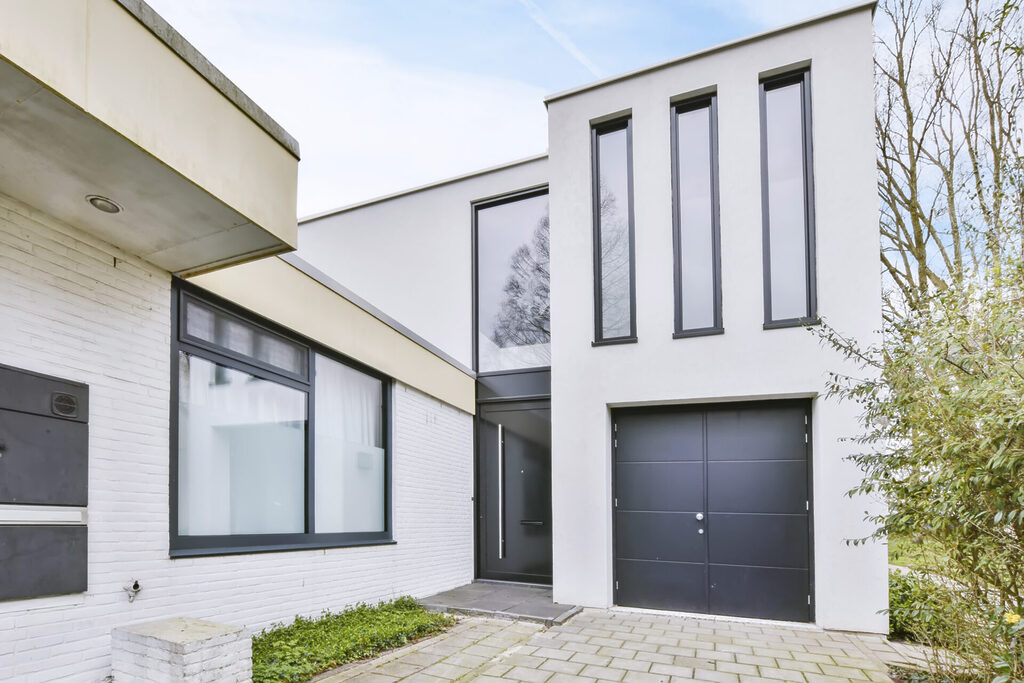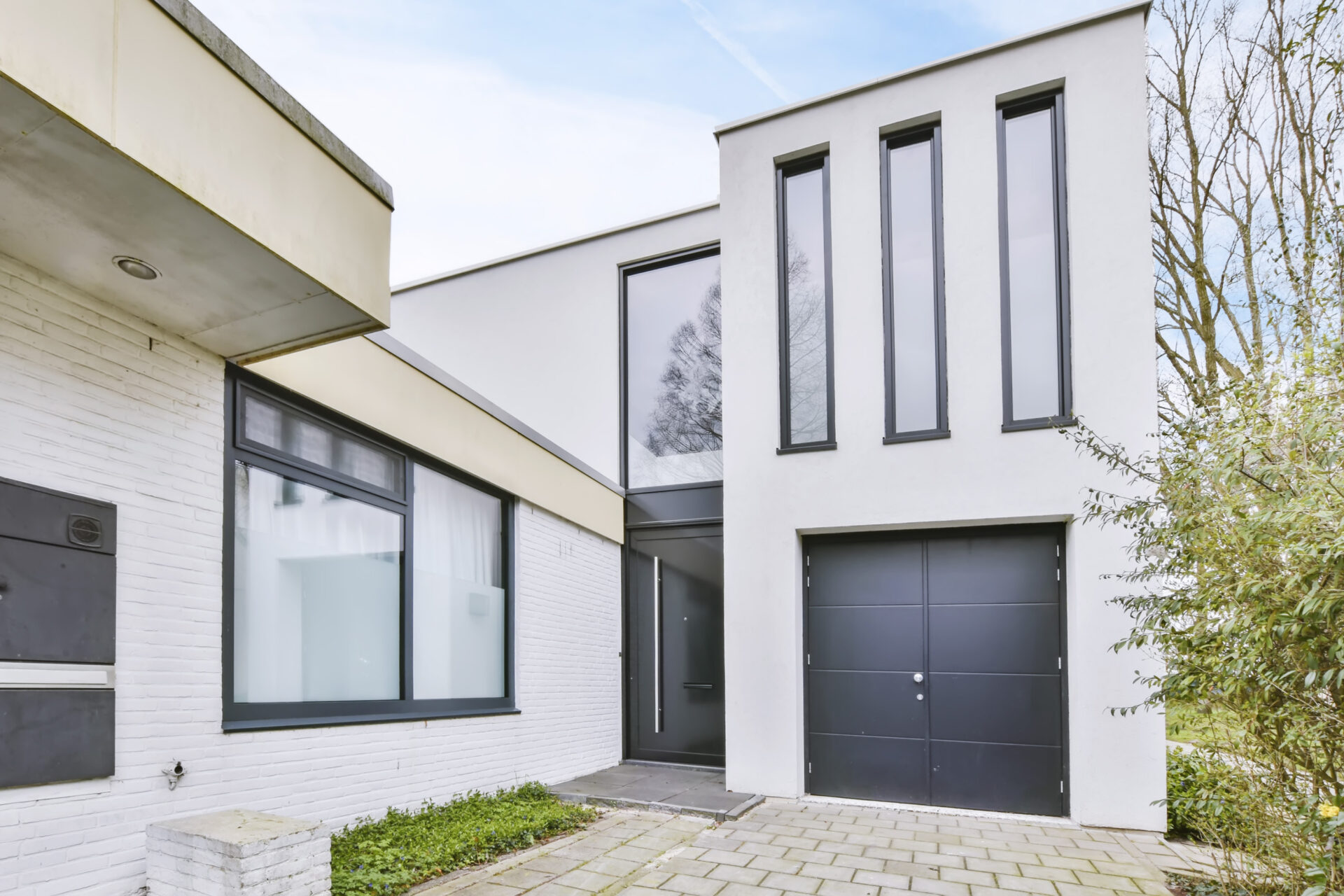From bifolds in small spaces to aluminium efficiency, GFD Homes answers your top questions on composite doors, windows, and roof lanterns in Part 4.
What You’ll Learn:
- Why composite doors resist fading and last longer than timber
- The facts on door and window sizes, including bespoke options
- How bifold and sliding doors adapt to small spaces and wide openings
- The energy efficiency and sustainability of modern aluminium products
(Estimated Reading Time: 4-5 Minutes)

In Parts 1–3 of our series, we’ve covered everything from painting composite doors to bifold value and sliding vs French doors. For Part 4, we’re answering another set of the UK’s most common homeowner questions, spanning composite doors, entrance doors, bifolds, sliding doors, aluminium front doors, aluminium and uPVC windows, roof lanterns, and front doors.
Composite Doors: Do Composite Doors Fade Over Time?
This is a practical question we hear a lot. Older doors often lost their colour after years of exposure to the sun — but composite doors are different.
The GRP skin on a Composite Door is engineered to resist UV fading, scratching, and weather damage. While any product exposed to sunlight can show slight changes over decades, you can expect a composite door to keep its colour far longer than timber or older uPVC alternatives.
Entrance Doors: What Is the Standard Size of an Entrance Door in the UK?
The typical UK entrance door measures around 900mm wide by 2100mm tall. But in practice, “standard” is rare. Many homes have slightly different openings, especially period properties.
At GFD Homes, all Entrance Doors are made-to-measure, ensuring a perfect fit every time. This avoids draughts, improves security, and creates a better finish.
Bifold Doors: Do Bifold Doors Work in Small Spaces?
Yes — and this surprises many people. While bifolds are often seen on large extensions, they can also transform smaller areas:
- Two-panel bifolds create wide openings in compact kitchens.
- Slim sightlines maximise light even with fewer panels.
- Custom sizes mean no wasted space.
Our Aluminium Bifold Doors are bespoke, so we can adapt them to both large and small homes.
Sliding Doors: How Wide Can Sliding Doors Be?
A great question from those designing extensions. Modern Sliding Doors can be manufactured in panels up to 3 metres wide. This means you can achieve expansive glass walls with just two or three panels, creating uninterrupted views.
Larger spans require specialist glazing and strong aluminium frames — both of which are part of our product range.
Aluminium Front Doors: Are Aluminium Doors Energy Efficient?
Another common misconception is that aluminium equals cold. Not true anymore.
Our Aluminium Front Doors use thermal breaks within the frame and insulated cores. Combined with high-performance glazing, this means U-values as low as 1.0 W/m²K — fully compliant with UK regulations.
Aluminium Windows: Can Aluminium Windows Be Recycled?
Sustainability is an increasingly common concern, and the answer is yes — aluminium is one of the most recyclable building materials in the world.
Our Aluminium Windows are not only long-lasting (30+ years), but at the end of life, they can be recycled into new products with minimal waste. This makes them an eco-friendly choice compared to some plastics.
uPVC Windows: How Long Do uPVC Windows Last?
Typically, 20–25 years with minimal upkeep. Advances in uPVC technology mean modern frames resist yellowing, warping, and cracking far better than older versions.
At GFD Homes, our uPVC Windows come with robust guarantees so you can trust in their performance for decades.
Roof Lanterns: Do Roof Lanterns Make Rooms Too Bright?
It’s a funny one — most people worry about being too dark, but some ask if lanterns let in too much light.
Modern Roof Lanterns are designed with glazing options that control glare, including solar control coatings and tinted glass. This means you enjoy the benefits of natural light without overheating or excess brightness.
Front Doors: What’s the Difference Between Composite and Timber Front Doors?
It’s a comparison question we’re asked often. Timber has tradition, but composite doors offer clear benefits:
- Maintenance: Composite needs almost none; timber requires repainting.
- Durability: Composite resists warping, swelling, and cracking.
- Efficiency: Composite achieves lower U-values, cutting heat loss.
At GFD Homes, our Front Doors include both composite and aluminium designs, giving you a modern alternative to traditional timber.
Conclusion: More Answers, More Confidence
From durability and sizes to energy efficiency and recyclability, these are the questions we hear from UK homeowners daily. The good news is that the answers are straightforward — and at GFD Homes, you can explore options online with transparent pricing and expert support.
With transparent pricing, instant online quotes, and nationwide delivery, you can explore your options without pressure.
🛒 Browse the full collection at www.gfdhomes.co.uk
📞 Or call 01642 309576 for expert guidance and a no-pressure quote.
In a rush? Why not contact us via Whatsapp
Browse our Articles
- GFD Homes Answers Top Doors & Windows Questions – Part 1
- GFD Homes: Your Door & Window Questions Answered Part 2
- GFD Homes: Questions on Doors & Windows Answered – Part 3
- Looking for Trade Products? Try The Trade Village
Do composite doors lose their colour in the sun?
A: Modern composite doors from GFD Homes use GRP skins that resist UV damage, so fading is minimal even after decades of exposure.
Q: Can bifold doors work in smaller homes?
A: Yes — two-panel bifolds or slimline aluminium systems are perfect for compact spaces, offering light and flexibility without overwhelming the room.
Q: Are aluminium products sustainable?
A: Absolutely. Aluminium doors and windows from GFD Homes are long-lasting and 100% recyclable, making them an eco-friendly choice.
Q: Do roof lanterns make a room too bright?
A: Not if you choose the right glazing. Solar-control or tinted glass balances natural light with comfort.

